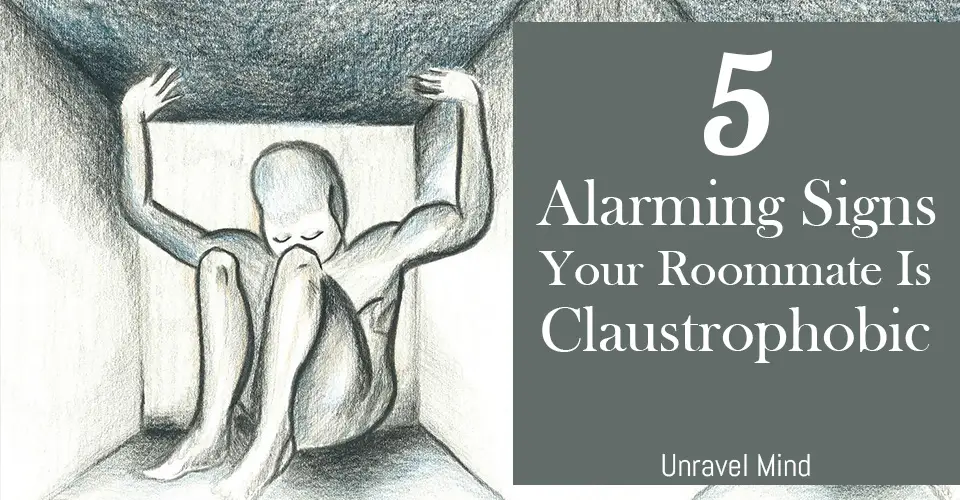Individuals are subjected to different kinds of negative and positive emotions. Fear is one of the emotions that we all have at a time for a short duration, triggered by an object, person, or event.
Excessive or persistent fear of an object or situation can be categorized as a phobia. A person with phobia undergoes an irrational fear of the fearful object, person, place, or situation.
To clinically diagnose a person with phobia it has to sustain six months, interfering with the person’s personal, social, and occupational life.
Claustrophobia- what is it?
Phobia can be of many types; a person may have a phobia of enclosed spaces is known as claustrophobia.
A person with claustrophobia may feel a terrible and uncontrollable surge of fear and discomfort while staying in a closed room, elevators, tunnels, locked cars, small bathrooms, or a crowded place. These may be because of a traumatic experience deeply rooted in childhood or adolescence.
Though the manifestations arising out of encountering the situation of phobia may vary among individuals. Every person does not have similar reactions. You may find contrasting reactions and displays of fear of the same type of phobia.
It is extremely painful for someone to live with a person with claustrophobia. You need to be cautious about their trouble. If you are staying out of your own home and sharing a room with a person with claustrophobia you need to take extra attention to their struggles.
You should know the signs and symptoms of claustrophobia if you get to see that your roommate is one of the individuals with claustrophobia.
Symptoms of claustrophobia
People with claustrophobia may experience episodes of panic attacks. They may feel anxious and want an escape from the phobic situation.
Here are common signs and symptoms of claustrophobia:
- Sweating and chilling sensations
- Dryness of mouth
- Shaking and numbness
- Difficulties to breathe properly
- Chest pain
- Feelings of dizziness
- Nausea
- An uncontrollable urge to urinate
- Disorientation
- Headache
Along with these physiological symptoms, people with claustrophobia may also experience psychological symptoms of fear of facing death, losing control, falling unconscious.
Recognizing these physiological and psychological signs might serve you adequately to deal with your roommate with claustrophobia.
What it is to discover your roommate has claustrophobia?
It is not easy to live with someone with claustrophobia. You should take care of them so that they don’t get uneasy or hesitant during their spell of meeting their phobic reactions.
If a member from your family has claustrophobia then you are not solely responsible to assist the person but living in a room with symptoms of physical and mental health issues can influence your personal, social, and professional life as well.
These are some alarming signs your roommate has claustrophobia:
1. Feelings of discomfort when windows are closed
Your roommate might get uneasy if you both are staying in the same room and the windows are closed almost every time.
The person may complain of feeling suffocated, sweat excessively, and shortness of breathing. You should take such complaints seriously.
2. Annoyance over the social gathering in the room
If you are a college student or an employee then it is nothing unusual to throw a house party at your house frequently. You may discover that your roommate protests against such parties because of a crowd gathering in the same room.
The person may get annoyed at the presence of several people in the room. Signs of headache, nausea may be observed.
3. Trouble in getting into elevators
Whenever you go out of the building your roommate would avoid using the elevator and insist to step down the apartment by stairs. If you visit nearby shopping malls they will behave the same way and may also refrain from using trial rooms in the shop.
You can help your roommate by accompanying them while getting down of a building or wandering around a congregation in the market.
4. Establish connections with the family members
The presence of family members always provides a sense of comfort to us. So try to establish contacts with the parents or any relative close to your roommate.
Whenever you are away from the residence someone from the family can come for aid. Your roommate will also feel less lonely.
5. Encourage to seek professional advice
You can encourage your roommate to seek professional guidance and suggestion to deal with claustrophobia and overcome it.
Medicines prescribed by the doctor will be suitable along with psychotherapy. Psychotherapy works wonders in the treatment of phobia.
Meditation can be beneficial to deal with the physiological symptoms associated with claustrophobia.
Treatment may take a longer time but it is possible to treat claustrophobia.
So if you have a roommate with claustrophobia then do not get scared, do not form opinions rather assist them to overcome it.
Read more : Mindfulness Meditation: A Complete Guide to Self-Awareness


Leave a Reply
You must be logged in to post a comment.